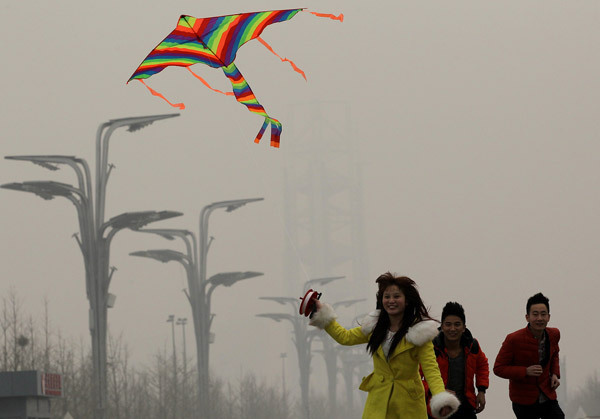 Deng Xiaoping: 'I have a clear conscience all my life'
Deng Xiaoping: 'I have a clear conscience all my life'
 Xi Jinping: 'The people are our strength'
Xi Jinping: 'The people are our strength'
 Amazing cliff diving in cold winter
Amazing cliff diving in cold winter
 Enjoy Sochi 2014 in slow motion
Enjoy Sochi 2014 in slow motion
 University student sentenced to death for poisoning roommate
University student sentenced to death for poisoning roommate
 Chinese lunar New Year celebrated in San Francisco
Chinese lunar New Year celebrated in San Francisco
 Taiwan Lantern Festival 2014
Taiwan Lantern Festival 2014
 Haiyang Yangge: make up
Haiyang Yangge: make up
 China's top 10 richest cities
China's top 10 richest cities
 |
| Tourists from Sichuan province brave heavy smog on Monday to fly a kite near the National Stadium. The haze is likely to continue in Beijing this week. Air pollution is likely to be hot topic during the upcoming two sessions in Beijing next month. Zhang Wei / China Daily |
Environmental issues, especially the nation's problems with smog, will be a major focus at the upcoming plenary sessions of the National People's Congress and the National Committee of the Chinese People's Political Consultative Conference, according to officials who are busy preparing legislative proposals for the annual meetings.
"I am working on economic and technical proposals that will implement the clean burning of coal, which will help solve our smog problem," said Cao Xianghong, a petrochemical expert at the Chinese Academy of Engineering.
The proposal by Cao, a member of the National Committee of the CPPCC, will suggest that the task of burning coal fall more heavily on large enterprises instead of individual households in order for the government to better manage emissions.
Yao Tandong, who last year recited a poem to President Xi Jinping during the two sessions to poke fun at the heavy smog, said his proposals will likely be about pollution. Yao is the director of the Chinese Academy of Sciences' Institute of Tibetan Plateau Research and a member of the National Committee of the CPPCC.
Chai Fahe, vice-president of the Chinese Research Academy of Environmental Sciences, said airborne pollution will be a hot issue at the two sessions for years to come. Chai added that several legislators have inquired into the latest draft of the nation's Atmospheric Pollution Prevention Act that will be submitted to the NPC at the two sessions.
"The revision of the act will be a major discussion point at this year's two sessions," he said.
"The legislators' proposals will mainly focus on three aspects: to accelerate the revision process; to clarify the responsibilities of local governments and polluters, which includes strengthening penalties; and to enhance the management on mobile pollution sources."
Chai said many legislators will likely bring up the public's heightened expectations of cleaner air as China releases its Airborne Pollution Prevention and Control Action Plan (2013-17) on the national level and as local governments create anti-pollution action plans.
Leading up to the two sessions, combating smog was a top priority at many provincial legislative sessions in January and February.
Last month, Beijing passed an airborne pollution prevention law that sets a pollution reduction target. The regulation provides a general framework for action that will be augmented by detailed directives to be published soon. It will take effect on March 1.
With many legislators focusing on battling smog, others said they will focus on other environmental issues, such as water pollution and ecological security.
"I've already known enough deputies who are preparing to bring up smog in their proposals," said Gao Jixi, director of the ecology institute of the Chinese Research Academy of Environmental Sciences.
He said he is working on a proposal about how to manage nature reserves to build an ecological network.
Gao, who is also a member of the CPPCC, said he may also raise another proposal that tackles environmental problems during the process of urbanization.
Thick smog has enveloped northern China for the past five days, affecting more than one million square kilometers of the country.
 Chinese Dream: the Chinese Spirit and the Chinese Way
Chinese Dream: the Chinese Spirit and the Chinese Way 51 bronze sacrificial utensils unearthed in Shaanxi province
51 bronze sacrificial utensils unearthed in Shaanxi province Most gorgeous female celebs in Chi-pao
Most gorgeous female celebs in Chi-pao Second round of test kicks off at Beijing Film Academy
Second round of test kicks off at Beijing Film Academy Ancient Qiang people had vertically grown teeth
Ancient Qiang people had vertically grown teeth Top 10 Chinese youth’s favorite seaside destinations
Top 10 Chinese youth’s favorite seaside destinations Traditional Tibetan clothing tailors
Traditional Tibetan clothing tailors In photos: Unveiling Taishan station
In photos: Unveiling Taishan station Beautiful moments of family reunion
Beautiful moments of family reunion Chinese warplanes C919 to appear at Singapore Airshow 2014
Chinese warplanes C919 to appear at Singapore Airshow 2014 Ruins of Shang Dynasty's structure unearthed in Shaanxi
Ruins of Shang Dynasty's structure unearthed in Shaanxi  Intercity high speed train in operation
Intercity high speed train in operation Severe coldness freezes large parts of China
Severe coldness freezes large parts of China  Beautiful moments of Sochi
Beautiful moments of Sochi  It's not just performing this year
It's not just performing this yearDay|Week|Month